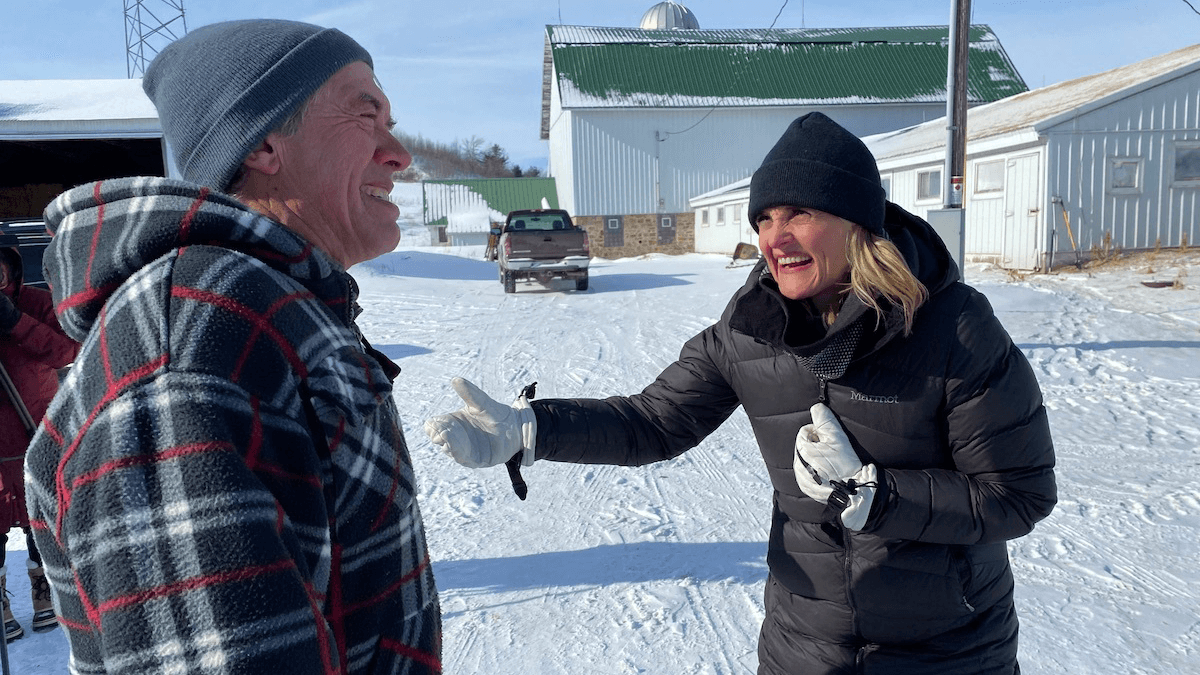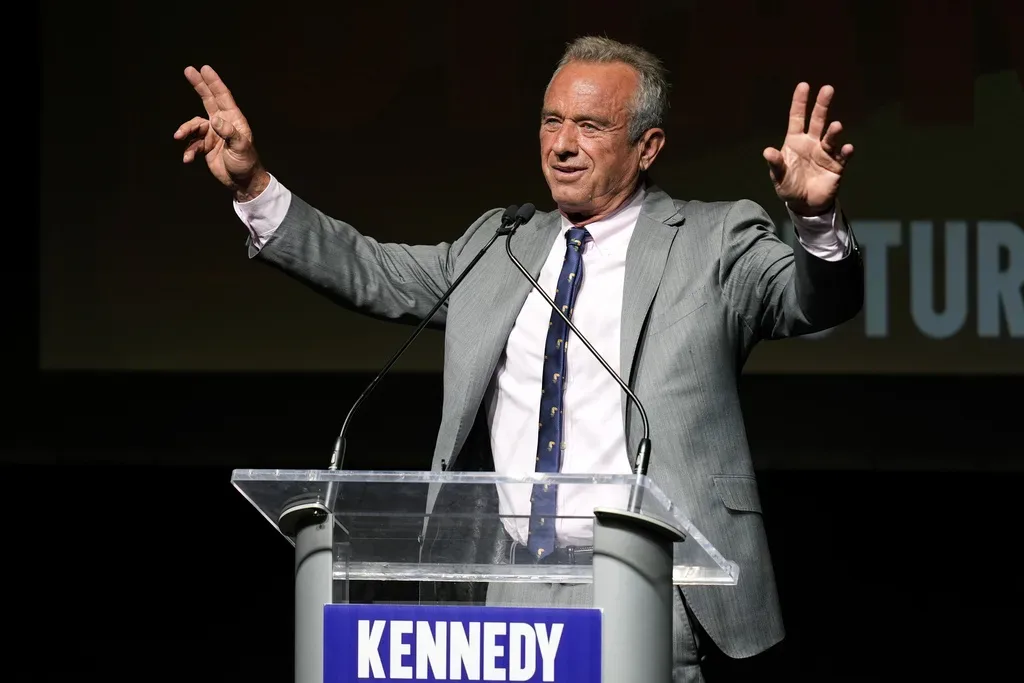
Democratic US Senate candidate Sarah Godlewski speaks with Matt Gabler Wednesday on Gabler's farm in eastern Eau Claire County about struggles Wisconsin farmers face. Godlewski's stop was part of a three-day tour to unveil her plan to assist Wisconsin's rural areas. (Photo by Julian Emerson)
Her Plan to Address Rural Needs Includes Making Broadband a Public Utility, Along with Increasing Access to Health Care and Child Care
As rural Augusta farmer Matt Gabler hurried to finish chores Wednesday morning to join Democratic US Senate candidate Sarah Godlewski for a press conference at his farm, he was delayed by problems with a silo unloader that had frozen in the below-zero weather.
“We have problems with that when it gets this cold,” Gabler said. “It’s like farming in Wisconsin these days. Lots of challenges.”
Struggles are nothing new to Gabler, who farms about 300 acres in eastern Eau Claire County, and other Wisconsin farmers. Volatile milk and crop prices that often fail to meet the cost of production have prompted a record number of farmer bankruptcies across the state in recent years. Farmers’ problems have been exacerbated during the coronavirus pandemic in the form of higher costs and supply chain disruptions.
To address those issues, on Tuesday Godlewski released her plan for rural Wisconsin, a proposal designed to address such issues as increasing broadband internet access, expanding health care and child care options, and boosting education and job opportunities. The plan also would create policies to help the state’s family farms and fight the effects of climate change while protecting natural resources.
Her stop in rural Eau Claire County was part of a three-day tour announcing her rural agenda.
“Our rural communities feel left behind,” said Godlewski, one of 14 Democratic senate candidates who will face off in an Aug. 9 primary election. “They want to have the same services available as people in urban areas. They want affordable health care and child care, good schools, broadband access, and good jobs. For too long Washington politicians haven’t met their needs, and we have to change that.”
The winner of the Democratic primary will likely face Republican incumbent US Sen. Ron Johnson in November who recently announced he would seek a third term despite an earlier pledge not to.
Reforming an outdated milk-pricing structure and altering federal farm commodities so farmers receive a more stable income are needed to assist farmers, Godlewski said. She is upset that the Senate Agriculture Committee does not include a Wisconsin representative, one reason the needs of farmers in the dairy state are often not addressed, she said.
If elected, Godlewski said she would oppose continued consolidation of agribusiness that favors large farms at the expense of smaller family farmers. She proposed capital gains tax reform to provide financial support for family farmers and pledged to provide funding for farmer mental health services.
For years rural areas have lost population to more urban ones, largely because of available jobs. Many people want to live in Wisconsin’s rural locations, Godlewski said, but often can’t because lack of broadband internet access means they can’t work remotely. About one of every four households in the state’s rural regions lack broadband connectivity.
Comparing broadband access to the electrification of rural areas last century, Godlewski proposes making broadband a public utility. She said boosting broadband connections is necessary for rural residents to access employment, education, and healthcare options. Increased broadband also would help attract more young people to increasingly aging rural places.
“How do we convince young people to move to rural Wisconsin? Give them access to broadband,” she said.
Gabler hopes policies to help more farmers make it financially and other policies to positively impact rural areas become reality. He bought his farm 38 year ago and sold his dairy herd in 2010 as dairy farming became increasingly challenging. These days he grows corn and soybeans and houses his brother’s cattle on his farm.
“With the way things are these days, if you go and borrow money to buy your land and equipment and animals and start up a farm, you’re probably not going to make it,” he said. “We need to see some changes so more people can make a living farming again.”
Politics

Opinion: Many reasons why young adults should refuse to let Republicans kill the Affordable Care Act
In this op-ed, University of Wisconsin Medical School student, Samantha Crowley, shares the importance of young adults protecting the Affordable...

He said what? 10 things to know about RFK Jr.
The Kennedy family has long been considered “Democratic royalty.” But Robert F. Kennedy, Jr.—son of Robert F. Kennedy, who was assassinated while...
Local News

Stop and smell these native Wisconsin flowers this Earth Day
Spring has sprung — and here in Wisconsin, the signs are everywhere! From warmer weather and longer days to birds returning to your backyard trees....

Your guide to the 2024 Blue Ox Music Festival in Eau Claire
Eau Claire and art go hand in hand. The city is home to a multitude of sculptures, murals, and music events — including several annual showcases,...



